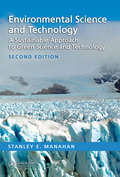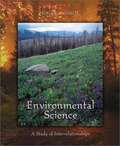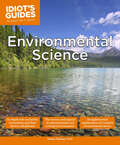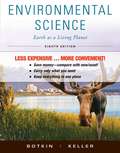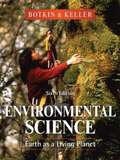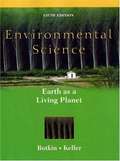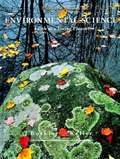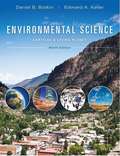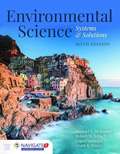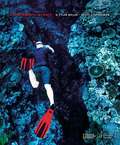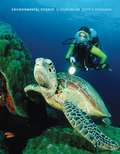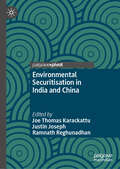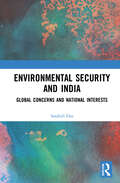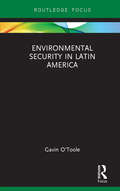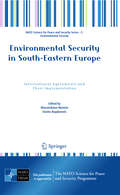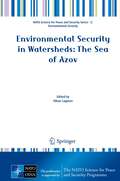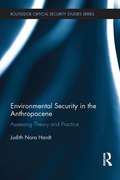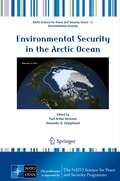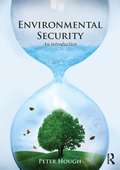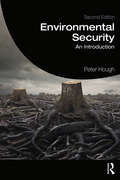- Table View
- List View
Environmental Science and Technology: A Sustainable Approach to Green Science and Technology, Second Edition
by Stanley E. ManahanFormally established by the EPA nearly 15 years ago, the concept of green chemistry is beginning to come of age. Although several books cover green chemistry and chemical engineering, none of them transfer green principles to science and technology in general and their impact on the future. Defining industrial ecology, Environmental Science and Tec
Environmental Science: A Study of Interrelationships (Thirteenth Edition)
by Bradley F. Smith Eldon D. EngerThe book provides information and the conceptual framework needed to understand complex issues so that readers can comprehend the nature of environmental problems and formulate their own views.
Environmental Science: A Study of Interrelationships Eighth edition
by Bradley F. Smith Eldon D. EngerEnvironmental Science is an interdisciplinary field. Because environmental disharmonies occur as a result of the interaction between humans and the natural world, we must include both when seeking solutions to environmental problems.
Environmental Science: An In-Depth Look at Earth’s Ecosystems and Diverse Inhabitants (Idiot's Guides)
by James DaurayEnvironmental science is an integrated, interdisciplinary field that combines the study of ecology, physics, chemistry, biology, soil science, geology, atmospheric science, and geography. It is among the top 10 most popular Advanced Placement examinations taken by high school seniors in an effort to receive postsecondary college credit. Idiot's Guides: Environmental Science provides a step-by-step review of the disciplines that comprise environmental science, helping students grasp the basic concepts, internalize the information, and prepare for exams. Features include: The basics and history of the human relationship with the natural environment. The ways species grow, change, and interact. A detailed description of the earth's ecosystems, including deserts, grasslands, forests, and aquatic ecosystems. The effects of economics and agriculture on the environment. The various types of energy humans use, as well as how its production impacts the earth's ecosystems, with a focus on renewable energy sources. The ill effects of a growing population, including pollution, toxins, bacteria, waste, and global warming/climate change.
Environmental Science: Earth As A Living Planet 8th Ed
by Daniel B. Botkin Edward A. KellerEnvironmental Science: Earth as a Living Planet, Eighth Edition provides emphasis on the scientific process throughout the book gives readers the structure to develop their critical thinking skills. Updated and revised to include the latest research in the field, the eighth edition continues to present a balanced analytical and interdisciplinary approach to the field. New streamlined text clears away the "jargon" to bring the issues and the science to the forefront.
Environmental Science: Earth As a Living Planet
by Daniel B. Botkin Edward A. KellerUpdated and revised to include the latest research in the field, the new Sixth Edition of Environmental Science continues to present a balanced analytical and interdisciplinary approach to the field. This approach equips readers with a solid scientific background in environmental science, so they can think through environmental issues and make their own decisions. Five central themes are weaved throughout the book: Human Population Growth, Sustainability, A Global Perspective, An Urban World, and Science and Values.
Environmental Science: Earth as a Living Planet
by Daniel B. Botkin Edward A. KellerAn introductory textbook that presents the most important concepts in the study of the environment from an analytical and interdisciplinary perspective, and encourages students to formulate their own thoughts about environmental problems. Annotation c. by Book News, Inc. , Portland, Or.
Environmental Science: Earth as a Living Planet
by Daniel B. Botkin Edward A KellerEnvironmental Science: Earth as a Living Planet provides an up-to-date introduction to the study of the environment. Information is presented from an analytical and interdisciplinary perspective from which we must view environmental issues in order to deal successfully with them. The goal is to teach the students how to think through environmental issues.
Environmental Science: Earth as a Living Planet (3rd edition)
by Daniel B. Botkin Edward A. KellerAn introductory textbook that presents the most important concepts in the study of the environment from an analytical and interdisciplinary perspective, and encourages students to formulate their own thoughts about environmental problems. Annotation C. by Book News, Inc., Portland, Or.
Environmental Science: Earth as a Living Planet (Ninth Edition)
by Daniel B. BotkinEnvironmental Science: Earth as a Living Planet, Ninth Edition provides emphasis on the scientific process throughout the book and gives readers the structure to develop their critical thinking skills. Updated and revised to include the latest research in the field, the 9th edition continues to present a balanced analytical and interdisciplinary approach to the field.
Environmental Science: Merit Badge Series
by Boy Scouts of AmericaA guide for completing the environmental science merit badge for Boy Scouts.
Environmental Science: Systems and Solutions
by Logan Yonavjak Michael McKinney Robert Schoch Grant Mincy<p>What is the "big picture" in environmental science? Our authors know and effectively communicate it in Environmental Science: Systems and Solutions, Sixth Edition. Whether you view the subject through a scientific, social, political, or historical lens, you'll find the concrete foundations here that work for courses in both environmental science and environmental studies. A systems approach is the connective fabric that makes sense of the wealth of topics and data, which demonstrates how aspects of the natural environment interconnect with each other and with human society. A section on Resource Use and Management introduces the concept of sustainability, and another on Dealing with Environmental Degradation discusses threats to the environment and mitigation strategies. A bonus section available online on Social Solutions to Environmental Concerns, discusses the complex issues impacting the environment and the scientific, technologic, and human behavioral ways to address them. Throughout the text you will find the hard data necessary for a scientific study of the environment and the measured analysis ideal for our time. <p>Combining evidence-based, contemporary information and data with relevant case studies, practical applications, numerous calculations, and modern references, Environmental Science: Systems and Solutions teaches and engages.</p>
Environmental Science: Working With The Earth (Wadsworth Biology Ser.)
by G. Tyler Miller Scott E. SpoolmanNIMAC-sourced textbook
Environmental Securitisation in India and China
by Joe Thomas Karackattu Ramnath Reghunadhan Justin JosephThis book examines how emerging environmental challenges are situated within existing International Relations (IR) theoretical understandings of &‘security&’. As governments in the Global South undertake policy interventions to mitigate the impact of increasing climatic changes and yearn to achieve human-nature harmony, one can observe similar patterns of responses chiefly due to the ecology-economy dichotomy in these states and their societies. In this context, it brings to the readers various aspects of the theory and practice of state interventions in the form of environmental securitisation in the Global South majorly under four themes (encompassing theory and policy processes). Chapters in this volume explicate connections between the environment and International Relations Theory, securitisation in developing countries, state society and the environment in India and China and lastly, public participation and environmental policymaking. It presents a comprehensive and coherent overview of the politics of securitisation in India and China, two prominent economies in the Global South. Faculty and researchers who work on non-western International Relations theory and non-traditional security threats, policy practitioners and experts in environmental policymaking, and students of IR and Comparative Politics, chiefly, will benefit from this book.
Environmental Security and India: Global Concerns and National Interests
by Satabdi DasThis book examines environmental issues through the lens of security studies and presents a comprehensive analysis of Indian policy in dealing with threats posed by climate change. This volume, • Puts forward theoretical base for securitization of environmental issues, incorporating different schools of thought; • Presents a survey of global environmental politics in general and the effects of climate change and its consequences for India's national security in particular; • Examines the politics involved in India's environmental policy at both the domestic and international level; • Outlines key policy takeaways and possibilities for action that can help contain the threat of environmental change. A comprehensive guide to a new and emerging dimension in Indian security policy, this book will be essential reading for students and researchers of international relations, security studies, especially non-traditional security, public policy, especially environmental policy, and area studies.
Environmental Security in Latin America
by Gavin O'TooleThis book examines security in Latin America through an environmental lens, at a time when this region faces a broad and growing spectrum of threats. The book considers the backdrop against which security debates about Latin America have been conducted; the extent to which scholarship has been dominated by traditional US strategic concerns; and how, in the changing context at the end of the Cold War, some policymakers within Latin America itself at both national and regional levels began to reposition security. It argues that traditional security scholarship focusing on military defence and strategic affairs in this region is hard to explain and out of date, and offers reasons why a new focus on environmental threats within a broader human security perspective has much to offer this field. Such a focus is justified by the scale of the challenges that environmental degradation is posing in Latin America, and the very real impact of climate change there. The book considers how the various theoretical possibilities of the term ‘environmental security’ all have some potential application to this region, where the natural environment is rapidly being securitized by military forces on behalf of their states. Finally, it proposes that a fruitful approach to Latin America might be one where human and environmental security have parity. This book will be of interest to students of environmental security, Latin American security, human geography and IR in general.
Environmental Security in South-Eastern Europe
by Massimiliano Montini Slavko BogdanovicAuthored by international experts from academia, international organizations, governments and NGOs, this book highlights the main environmental security issues in the South-East European (SEE) countries, with a particular focus on climate change and water management. The common goal of the authors was to provide a reliable evaluation of whether existing legal regimes and correct implementation of applicable international treaties may contribute to reducing environmental security risks in the region. In-depth analyses and assessment of major challenges in compliance, serve as a firm ground which such evaluation is based on. This volume is recommended for public officials, legal practitioners and consultants. Its interest may also extend beyond the SEE countries, serving as a case-study of a broader and paradigmatic relevance of the analysis and management of environmental and security issues in a trans-boundary context.
Environmental Security in Watersheds: The Sea of Azov
by Viktor LagutovWatersheds, supplying crucial ecosystem services to humans, seem to be a logical territorial unit to integrate societal benefits and environmental needs in order to evaluate the sustainability of natural resource use patterns. Based on this belief the book is an attempt to initiate a comprehensive environmental security assessment in the basin of the Azov Sea, shared by Russia and Ukraine. Though the region provides a variety of essential services and plays a strategic role in national and international development plans, it has been excluded from most regional environmental discussions. At the same time there is an alarming degradation rate of basin freshwater ecosystems that has occurred due to overutilization of certain prioritized services (e.g. transportation). The collapse of neglected services (e.g. fishery and freshwater supply) poses serious threats to the national economies as well as the local population, and to mitigate these threats priority in water management should be given to securing sustainability of the regional freshwater ecosystems. In addition to the review of the current status of Azov ecosystem services, the authors analyze likely future availability and challenges. The relevant experience derived from basin management of the Black Sea and other similar basins is also discussed.
Environmental Security in the Anthropocene: Assessing Theory and Practice (Critical Security Series)
by Judith Nora HardtThis book provides a critical assessment of the theories and practice of environmental security in the context of the Anthropocene. The work analyses the intellectual foundations, the evolution and different interpretations, strengths and potential of the link between environment and security, but also its weaknesses, incoherencies and distortions. To do so, it employs a critical environmental security studies analytical framework and uniquely places this analysis within the context of the Anthropocene. Furthermore, the book examines the practice–theory divide, and the political implementation of the environmental security concept in response to global environmental change and in relation to different actors. It pays significant attention to the Environment and Security Initiative (ENVSEC), which is led by different programs of the United Nations, the OSCE and until recently by the North Atlantic Treaty Organization (NATO), among others, and has largely been overlooked in the academic literature to date. The goal is to study how environmental security practice could inform and shape the environmental security theory, and also to explore how, conversely, new theoretical insights could contribute to the enhancement of environmental security activities. This book will be of great interest to students and academic scholars of Environmental Security, Critical Security Studies, Green Political Theory, Global Governance and International Relations in general.
Environmental Security in the Arctic Ocean
by Paul Arthur Berkman Alexander N. VylegzhaninThis seminal book results from a NATO Advanced Research Workshop at the University of Cambridge with Russian co-directorship, enabling the first formal dialogue between NATO and Russia about security issues in the Arctic Ocean. Involving interdisciplinary participation with experts from 17 nations, including all of the Arctic states, this workshop itself reflects progress in Arctic cooperation and collaboration. Interests now are awakening globally to take advantage of extensive energy, shipping, fishing and tourism opportunities in the Arctic Ocean as it is being transformed from a permanent sea-ice cap to a seasonally ice-free sea. This environmental state-change is introducing inherent risks of political, economic and cultural instabilities that are centralized among the Arctic states and indigenous peoples with repercussions globally. Responding with urgency, environmental security is presented as an "integrated approach for assessing and responding to the risks as well as the opportunities generated by an environmental state-change." In this book - diverse perspectives on environmental security in the Arctic Ocean are shared in chapters from high-level diplomats, parliamentarians and government officials of Arctic and non-Arctic states; leaders of Arctic indigenous peoples organizations; international law advisors from Arctic states as well as the United Nations; directors of inter-governmental organizations and non-governmental organizations; managers of multi-national corporations; political scientists, historians and economists; along with Earth system scientists and oceanographers. Building on the "common arctic issues" of "sustainable development and environmental protection" established by the Arctic Council - environmental security offers an holistic approach to assess opportunities and risks as well as develop infrastructure responses with law of the sea as the key "international legal framework" to "promote the peaceful uses" of the Arctic Ocean. With vision for future generations, environmental security is a path to balance national interests and common interests in the Arctic Ocean for the lasting benefit of all.
Environmental Security in the Asia-Pacific
by Iain Watson Chandra Lal PandeyEnvironmental security has been one of the greatest threats of the twenty-first century. Crossing the tipping point of two degrees Celsius is projected to be catastrophic, but perennial policy gridlock at the United Nations' multilateral climate change negotiations has so far prevented significant progress. The Asia-Pacific region has much at stake in these negotiations—it is often regarded as the most climate-vulnerable region in the world and also harbors the largest number of poorpeople already affected and in danger of being affected by climate change. Existing climate change literature frames issues through the prism of North-South relations. In contrast, this book focuses on both North-South and South-South relations to reveal an understanding of major climate change and climate change management issues through practices and narratives of environmental security in a specific regional context. The case studies are diverse and represent both large emitters like China and India and the smallest emitter, Nepal, as well as resource-cursed Indonesia, dilemmatic New Zealand, and green visionaries Korea and Japan. Contributors analyze causal interlinkages that affect environmental security policy from both geopolitical and geoeconomic dynamics.
Environmental Security: An Introduction
by Peter HoughThis student-friendly textbook offers a survey of the competing conceptions and applications of the increasingly prominent notion of environmental security. The book is divided into three sections. In the first, the key theoretical and practical arguments for and against bringing together environmental and security issues are set out. The book then goes on to present how and why environmental issues have come to be framed in some quarters as ‘national security‘ concerns in the context of the effects of overpopulation, resource depletion, climate change and the role of the military as both a cause and a solution to problems of pollution and natural disasters. Finally, the third section explores the case for treating the key issues of environmental change as matters of human security. Overall, the book will provide a clear, systematic and thorough overview of all dimensions of an area of great academic and ‘real-world’ political interest but one that has rarely been set out in an accessible textbook format hitherto. This book will be essential reading for students of environmental studies, critical and human security, global governance, development studies, and IR in general.
Environmental Security: An Introduction
by Peter HoughThis textbook offers a student-friendly survey of the global politics of the environment through the prism of security studies. This book is divided into three thematic sections. The first part sets out the key theoretical and practical arguments for and against bringing together environmental and security issues. The second part examines why environmental issues have been framed by some as ‘national security‘ concerns in the context of the effects of overpopulation, resource depletion, climate change and the role of the military as both a cause and a solution to problems of pollution and natural disasters. Finally, the third section explores the case for treating the key issues of environmental change as matters of human security. The chapters have been updated to include the 2015 Paris Climate Change Accords, the Trump and Sendai Framework for Disaster Risk Reduction, and there is a new chapter on environmental history. Overall, the book provides a clear, systematic and thorough overview of an area of great academic and ‘real-world’ political interest. This book will be essential reading for students of environmental studies, critical and human security, human geography, development studies, and International Relations in general.
